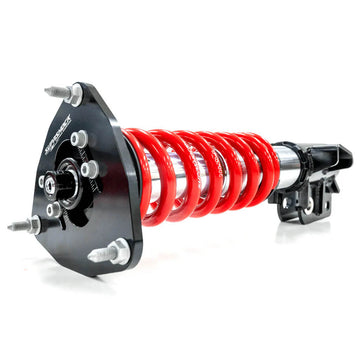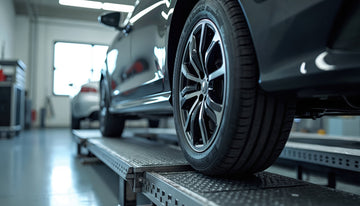Coilovers and air suspension are two distinct types of suspension systems that play a crucial role in shaping a vehicle's ride quality, performance, and overall driving experience. Whether you want improved handling, adjustable ride height, enhanced comfort, or the ability to carry heavy loads, understanding coilovers vs air suspension is essential.
The main difference between coilovers and air suspension lies in their fundamental design and function. Coilovers are a type of suspension system that combines a coil spring and a shock absorber into a single unit, providing a fixed ride height and adjustable damping. On the other hand, air suspension utilises air-filled bags or bellows that can be inflated or deflated to adjust the ride height, offering variable stiffness and the ability to raise or lower the vehicle at will.
What are coilovers vs air suspension?
Coilovers
Coilovers are a type of suspension system used in vehicles to provide support, dampening, and control over the vehicle's movement. The term "coilover" is derived from the combination of two components:
- Coil Spring: The coil spring is a metal spring, typically made of steel. It is designed to absorb and store energy when compressed and release it when the force is removed. The coil spring is responsible for supporting the weight of the vehicle and absorbing impacts from road irregularities, such as bumps and potholes.
- Shock Absorber: The shock absorber, also known as a damper, is a hydraulic or gas-filled component that controls the movement of the suspension system. It is usually housed inside the coil spring. The shock absorber dampens the oscillations of the coil spring, ensuring that the vehicle's wheels remain in contact with the road surface and minimising excessive bouncing or vibrations. It helps to maintain stability, improve handling, and provide a more comfortable ride.
Air Suspension
Air suspension is a type of suspension system that utilises airbags or air springs to support the vehicle's weight and provide a cushioning effect.
The air suspension system consists of several key components, including:
- Air Springs: The airbags or air springs are the primary components of the air suspension system. They replace the coil springs found in conventional suspensions. The airbags are designed to support the weight of the vehicle and provide a flexible and adjustable cushioning effect.
- Compressor: An onboard air compressor is responsible for supplying compressed air to the air springs. It pressurises the air and delivers it to the airbags, allowing them to expand and support the vehicle's weight. The compressor is typically powered by the vehicle's electrical system.
What are the benefits and advantages of coilovers?
Coilovers offer several benefits and advantages over air suspension systems. Here are some key advantages of coilovers:
Performance-oriented handling
Coilovers are known for providing excellent handling characteristics. They offer enhanced responsiveness, precise control, and improved feedback.
Simplified design
Coilovers have a relatively simpler design compared to air suspension systems. They consist of a coil spring and shock absorber integrated into a single unit, which makes them easier to install, maintain, and repair.
Durability
Coilovers offer the benefit of enhanced durability due to their robust construction and high-quality materials, allowing them to withstand the rigours of demanding driving conditions and provide long-lasting performance.
Cost-effectiveness
Coilovers are generally more affordable than air suspension systems. They offer a cost-effective way to improve handling and adjust the ride height of a vehicle.
Wide range of adjustability
Coilovers typically provide a greater range of adjustability compared to air suspension systems. They allow you to adjust the ride height by manipulating the threaded spring perch, enabling you to achieve a lower or higher stance according to your preference.
Reliable load carrying
While air suspension systems excel in load-carrying and towing applications, coilovers are generally more reliable for regular day-to-day driving without heavy loads.
What are the benefits and advantages of air suspension?
Air suspension offers several benefits and advantages over coilovers, including:
Adjustable ride height
One of the significant advantages of air suspension is its ability to adjust the ride height of the vehicle. By inflating or deflating the airbags, you can raise or lower the vehicle's stance.
Variable stiffness and damping
Air suspension systems can provide variable stiffness and damping characteristics by adjusting the air pressure in the airbags. This allows for fine-tuning the suspension response and adapting to different driving conditions or personal preferences. It provides a level of flexibility that is not easily achievable with coilovers.
Load levelling
Some models of air suspension automatically adjust the ride height and air pressure in the airbags to maintain a level stance, regardless of the load distribution. This feature is particularly useful when carrying heavy loads or towing, as it helps prevent sagging and ensures optimal suspension performance.
Improved handling and stability
Air suspension systems can adapt to changing driving conditions and adjust the suspension settings accordingly. This allows for improved handling, stability, and control, especially in challenging on-road or off-road situations. The ability to maintain a consistent ride height also contributes to better stability during cornering and manoeuvring.
Load carrying and towing capability
Air suspension excels in load-carrying and towing applications. The airbags can be inflated to provide additional support and prevent excessive compression when carrying heavy loads. This helps maintain proper ride height, stability, and handling characteristics, ensuring safe and comfortable driving while hauling or towing.
Coilovers vs. Air Suspension, which is better for my car?
The choice between coilovers and air suspension depends on your specific needs and preferences. Here are a few considerations to help you decide:
Desired ride characteristics
If you prioritise sporty handling, precise responsiveness, and a firmer suspension feel, coilovers might be the better choice. Coilovers are popular among performance-oriented drivers who prioritise improved cornering capabilities and a more connected driving experience.
Adjustable ride height
If the ability to adjust the ride height of your vehicle is important to you, then air suspension is the way to go. Air suspension allows you to raise or lower the vehicle's stance at any time, providing versatility for off-road driving, improved aerodynamics, or achieving a desired aesthetic.
Ride comfort
Air suspension generally offers a smoother and more comfortable ride compared to coilovers. If ride comfort is a top priority, especially for daily driving or long-distance journeys, air suspension can provide a more cushioned and isolated ride by absorbing road imperfections.
Load carrying and towing
If you frequently carry heavy loads or engage in towing activities, air suspension is often the preferred choice. Airbags in an air suspension system can be adjusted to support the additional weight, maintaining a level stance and optimal suspension performance. Coilovers may not handle heavy loads as effectively.
Budget
Coilovers are generally more affordable compared to air suspension systems. If budget is a significant consideration, coilovers may be a more cost-effective option while still providing improved handling and adjustability compared to stock suspensions.
Maintenance and complexity
Air suspension systems are more complex and require regular maintenance compared to coilovers. Airbags and air lines can be prone to leaks or failure, which may necessitate repairs or replacements. Coilovers, on the other hand, have fewer components and are typically easier to maintain.
How can I get coilovers from Supashock?
Once you decide you want coilovers from Supashock, we’re very easy to get a hold of. You can contact us by;
- Calling us on the phone at +61 08 8333 1123
- Emailing us at info@supashock.com
- Visiting us at 2-6 Ardtornish St, Holden Hill, SA 5088
Not only will we help you find the perfect coilovers, but we will answer any questions you have.





